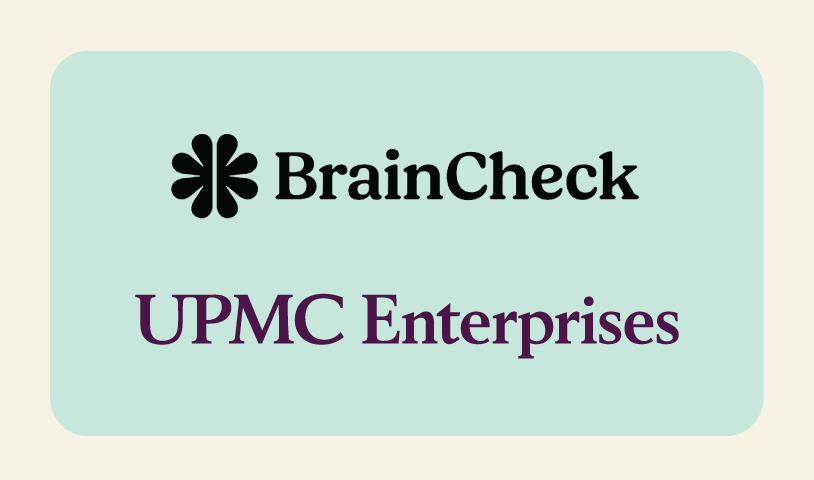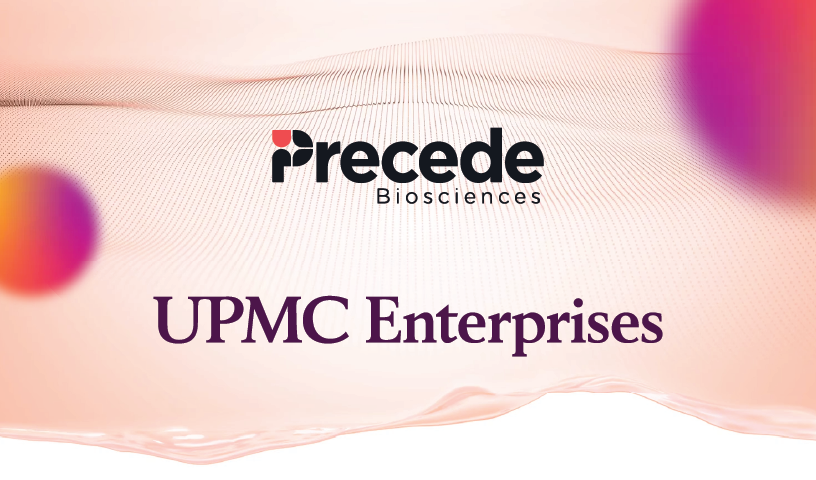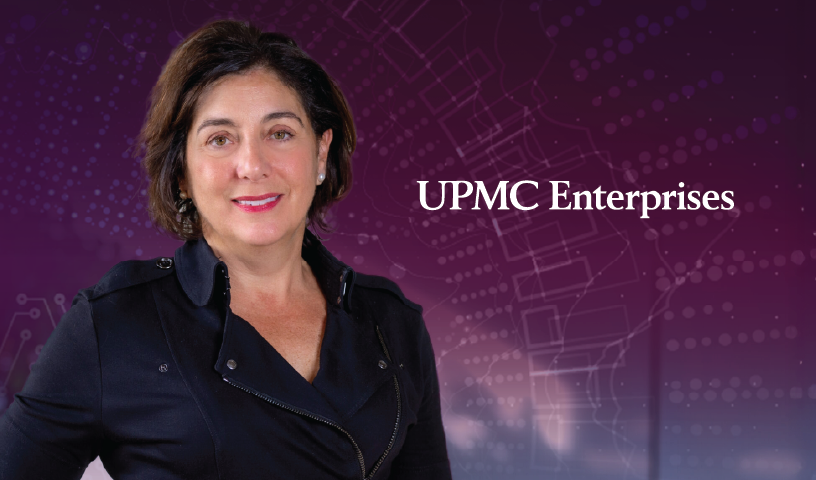
Jun 24, 2025
Expertise of UPMC Enterprises Guides Implementation of BrainCheck’s Cognitive Assessment Platform
A digital cognitive screening and assessment platform that is being rolled out in UPMC primary care practices highlights an important advantage UPMC Enterprises offers as an investor and partner to startup companies in digital health.
After investing in BrainCheck, a digital platform designed to enhance cognitive care, UPMC Enterprises has worked with UPMC clinicians to secure buy-in for BrainCheck’s technology, integrate the company’s platform into clinical workflows, and expand its use within UPMC’s large integrated network.
The role of clinical champions who work closely with business and technology experts at UPMC Enterprises is essential to the success of portfolio companies.
“UPMC Enterprises is able to vet new technology with clinical subject matter experts and bring solutions into clinical use and show how these technologies can be beneficial to our patients and our communities,” said Adele Towers, MD, senior clinical advisor to UPMC Enterprises and UPMC geriatrician. “You could have the greatest tool in the world, but unless you have the clinical expertise, workflow, and buy-in behind it, you’ll never succeed. That’s where UPMC Enterprises really excels.”
Along with Dr. Towers, the UPMC Enterprises team also worked with Jose Abad, MD, assistant professor, vice chair for Clinical Operations and Analytics at the University of Pittsburgh and a family medicine physician at UPMC, and Amanda Casagrande, MD, assistant professor at the University of Pittsburgh and medical director of UPMC’s University Family Medicine – Liberty Ave clinic.
The contributions of all three clinical champions were essential in bringing BrainCheck’s technology to UPMC patients, integrating the tool into clinical workflows, and getting buy-in across the care teams and patient populations to optimize understanding, utilization, and impact.
Chris Loughlin, CEO of BrainCheck, lauded the UPMC Enterprises team for being good partners to startups that could be concerned about the expectations of a large health system.
“Any good startup would naturally be cautious — worried about a big system gobbling them up, demanding too much time, or putting forward onerous terms,” Loughlin said. “But UPMC has been the opposite — collaborative, respectful, and grounded. They treat you like a partner, not a vendor.”
Digital Tools Offer Benefits for Patients and Providers
Dr. Towers, who is also a professor of geriatric medicine at the University of Pittsburgh, recognized the need for a digital tool that could make it easier for physicians to order cognitive assessments and patients to take them.
Many providers use a paper-based test, called the Montreal Cognitive Assessment (MoCA), to detect mild cognitive impairment and early signs of dementia. However, some patients experience difficulties completing the MoCA and it can be challenging for providers to offer the test, which can take 15 minutes or longer to complete, during a short in-person visit.
It is estimated that 42% of Americans over age 55 will eventually develop dementia, and the aging of the U.S. population is expected to lead to a doubling of new dementia cases per year by 2060, according to the National Institutes of Health. And about two out of three Americans experience some level of cognitive impairment at an average age of approximately 70 years.
Digital screening and assessment tools, such as BrainCheck’s platform, can make the process of ordering, completing, and reading a screening or assessment more seamless for providers and patients. By making it easier for patients to be screened, the hope is that more cognitive impairment and early stages of dementia can be detected and treated.
BrainCheck Joins UPMC Enterprises Portfolio
In her own geriatric medicine clinic, Dr. Towers experienced the challenges using paper-based tests. In 2020, she worked with UPMC Enterprises to research digital solutions that could replace traditional testing methods. BrainCheck rose to the top following a review of the market and in 2021 Dr. Towers tested it in her clinic to ensure a digital test was comparable to a paper test and that patients liked using an iPad to be screened.
In November 2021, UPMC Enterprises became an investor in BrainCheck; Nicholas Shapiro, vice president of UPMC Enterprises, joined BrainCheck’s board of directors.
Following the investment, BrainCheck was implemented at UPMC in the UPMC Center for Perioperative Care (CPC), which focuses on helping patients prepare for surgeries that require anesthesia. For some patients, there sometimes can be post-operative brain fog, or postoperative cognitive dysfunction (POCD), following surgery. The CPC has screened about 1,600 patients to determine if they’ve experienced POCD.
But in addition to screening surgery patients, the implementation at the CPC also helped UPMC Enterprises learn important lessons about integrating BrainCheck into the electronic health record and how to optimize workflows to the benefit of providers and patients using the platform.
Expanding BrainCheck to Primary Care at UPMC
Based on the CPC experience, in 2024 planning was initiated to implement BrainCheck into primary care practices within UPMC. While the CPC experience was helpful, new challenges had to be overcome to effectively integrate BrainCheck into primary care.
There was a clear need to integrate a consistent, easy-to-use tool for assessing cognitive abilities. “We have a lot of patients who come in after the age of 65 and one of the requirements when you’re doing an annual wellness visit is to document the patient’s cognitive abilities,” Dr. Abad said.
“There are many cognitive tests available, all of which tend to be long, take a while to administer, and are not very accessible for the physician in the in the moment. Or they necessitate bringing the patient back or making accommodations in the schedule. BrainCheck came in and said we can help to create a standardized way to evaluate your patient’s cognition and your staff can help to facilitate the administration of that test. And so that was very different,” Dr. Abad said.
Over the past 18 months, great lengths were taken to introduce staff and physicians to BrainCheck, integrate BrainCheck into the workflow, and provide BrainCheck assessments to patients at Dr. Casagrande’s family medicine practice in Pittsburgh.
Dr. Casagrande said there are advantages to having a digital screening tool that can be administered by clinic staff. “When we identify a patient 65 or older who has an annual wellness visit, we can order the BrainCheck screen. When the patient comes in, our staff gives them the iPad and brings up the test,” she said. “The patient can do the test in the room before the provider comes in to see them.”
Dr. Casagrande continued: “It’s great because we get real time data, so we’ll know right then if that patient has a possible impairment. If that’s the case, if it says ‘likely impairment,’ you know they need further testing. Then we get them set up to come back for an additional office visit where we can spend a lot more time going through the BrainCheck assessment, which is a longer test.”
Standardizing Care for UPMC Patients
While the rollout in UPMC’s family medicine practices has just begun, it’s clear to the providers that utilizing BrainCheck provides them and their teams an opportunity to deliver better care to patients, offer more sophisticated care within their offices at the time of the visit, and standardize care over a patient’s lifetime.
Dr. Abad pointed out, “the fact that BrainCheck can happen independent of the physician during an annual exam will help us to screen every patient consistently with a test that has high accuracy and fidelity and help us determine who might either have no cognitive issues or mild cognitive issues, or more significant cognitive issues. That will allow us to feel confident of the diagnosis that we’re making in primary care and then order the appropriate work up that would be needed to justify that diagnosis and then initiate treatment for those for that cognitive decline.”
Additional family medicine practices, plus geriatric medical practices, internal medicine practices, and community medicine practices across UPMC are expected to begin using BrainCheck over the coming months.
Next Steps
- Learn more about BrainCheck.
- Contact our investment teams to find out if your company or innovation ideas fit with our approach to innovation.
- Find out more about how UPMC Enterprises is supporting innovation in brain health.
Note: UPMC has a financial interest in BrainCheck.


